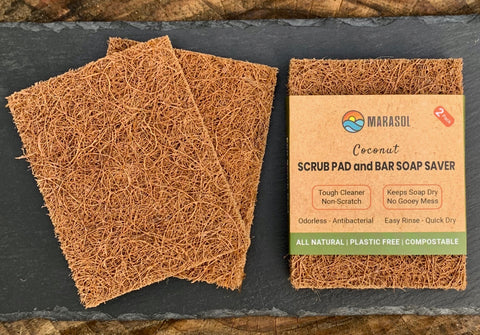Zero Waste Swap – Coconut Scrub Pad & Soap Saver

The Rise of Eco-Awareness
As more people embrace eco-conscious living, the demand for sustainable, low-waste alternatives continues to grow.
If you’ve found your way here, chances are you’ve already started making thoughtful swaps—reusable water bottles, beeswax wraps, metal straws, and bamboo toothbrushes may already be part of your routine.
Now, it’s time for your next upgrade: ditch plastic scrub pads and soap rests in favor of natural, compostable coconut fiber alternatives.
What's so Bad About Scrub Pads and Soap Saver Pads?
Nearly all scrub pads and soap saver pads are made of plastic, a material that never truly goes away. Every year, billions of sponges and scrub pads are used and discarded, ultimately ending up in landfills, the air, and our water.
The environmental toll of plastic goes far beyond waste. From production to disposal, plastic emits massive amounts of greenhouse gases. Meanwhile, over 11 million metric tons of plastic find their way into the ocean each year, threatening marine ecosystems worldwide.
Threat to Humans and the Environment
Have you ever eaten a credit card? The weekly intake of plastics among humans is approximately 5 grams, equivalent to the weight of a credit card. Sounds insane, right?
Scrub pads and soap saver pads are primarily made of plastic. If you look closely, you will find that even the "eco" and "nut" pads typically include plastic.
These all-plastic and part-plastic pads do not degrade completely. Some make their way to our oceans. Scrub pads are also a source of microplastic dust that can contribute to serious adverse human health outcomes.
Bioplastics are Not the Answer
Many scrub pad and soap saver makers tout their use of bioplastics, which are plastic-like materials made from plants or biological matter. Labeling products with "bio" implies they are sustainable and safe.
But the reality is different.
Turning plant material into bioplastic requires significant chemical processing. And nearly all bioplastics are biodegradable only at high heat, in industrial composting facilities. There are few of these facilities, so bioplastics are most likely to behave like petroleum-based plastic and not degrade, except into microplastics.
Zero Waste Alternatives
So, what are the options? Don't worry; we have it covered.
There are now truly eco-friendly scrub pads, sponges, and soap saver pads, providing consumers with more sustainable and healthier choices.
Coconut fiber scrub pads
Coconut fiber pads offer a smart, zero-waste alternative to traditional plastic scrub pads and soap rests. Made from upcycled coconut husk fibers and bound with natural latex and thread, these pads are entirely plant-based, biodegradable, and compostable.
Coir—the fibrous material from coconut husks—is naturally tough, absorbent, and non-scratch, making it ideal for cleaning cookware or gently scrubbing surfaces. It also works beautifully as a soap rest, allowing your bar soap to dry between uses and last longer.
If you're looking for how to reduce plastic pollution in our air and waterways, this is a simple yet impactful swap to support your low-waste lifestyle.
